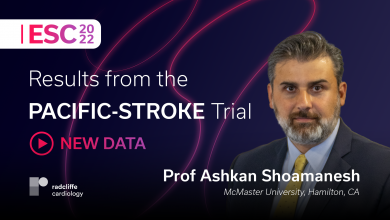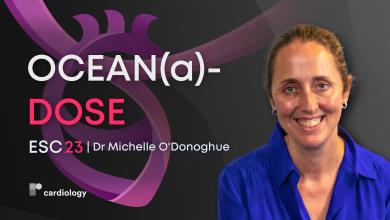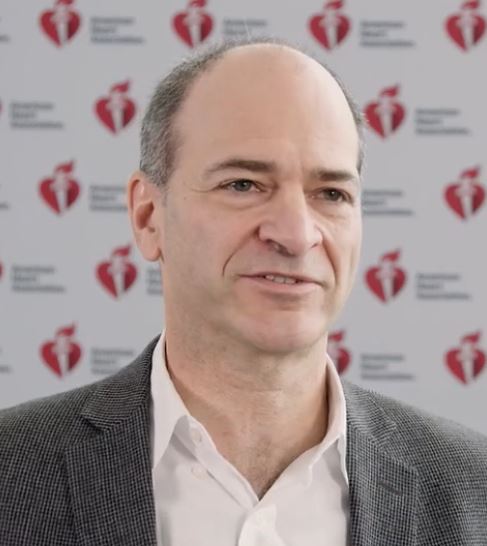Search results
Author(s):
Ashkan Shoamanesh
Added:
1 year ago
ESC Congress 22 — Prof Ashkan Shoamanesh (McMaster University, CA) reveals the findings of the PACIFIC-STROKE trial (NCT04304508). This multicenter study aims to find the best dose of oral FXIa inhibitor, asundexian (Bayer). 1808 patients with non-cardioembolic ischemic stroke were included in this trial, and were randomized to receive different doses of asundexian.
Questions:
What doses were…
View more
Author(s):
Nobutoyo Masunaga
,
Shuichi Ura
,
Mitsuru Ishii
,
et al
Added:
3 years ago
Topic: Atherosclerosis (Clinical), Cardiac Catheterisation
The lymphatic system has been suggested to play an important role in cholesterol metabolism and cardiovascular disease. Vascular endothelial growth factor-C (VEGF-C) plays a key role in lymphangiogenesis. Recently, we demonstrated that VEGF-C is closely associated with dyslipidaemia and atherosclerosis. However, the relationship between…
View more
Author(s):
Michelle O'Donoghue
Added:
7 months ago
ESC 23 — Dr Michelle O'Donoghue (Brigham and Women's Hospital, US) outlines a trial update from OCEAN(a)-Dose Extension trial (NCT05581303) in this succinct interview.
OCEAN(a)-DOSE (Amgen) was a dose-finding study aiming to evaluate a siRNA, olpasiran, and its effect on risk for coronary heart disease death, myocardial infarction or urgent coronary revascularization when administered…
View more
Paul M Ridker
Job title: Senior Physician, Brigham and Women's Hospital Eugene Braunwald Professor of Medicine, Harvard Medical School
Author
Author(s):
Andrew Carson
Added:
3 years ago
For many years cardiovascular disease has been a major cause of morbidity and mortality across the developed world, and its incidence is also increasing in many developing countries. Indeed, it has recently been shown that even Egyptian mummies, representing the more affluent members of their society several thousand years ago, had established atherosclerosis in multiple blood vessels.1…
View more
Thomas Kahan
Research Area(s) / Expertise:
Author
Author(s):
Mattia Cattaneo
,
Alberto Froio
,
Augusto Gallino
Added:
3 years ago
Imaging has played an instrumental role in the diagnostic and prognostic assessment of cardiovascular diseases. Arterial Doppler ultrasound, echocardiography, myocardial perfusion imaging tests and angiography are now part of everyday clinical practice and represent a cornerstone of atherosclerosis management.1 During the past two decades, there has been an expansion of the available imaging…
View more
Added:
1 week ago
Source:
Radcliffe Cardiology, Greg Guillory
Two late-breaking clinical trials addressing cardiovascular outcomes in patients with diabetes were presented this week at the American College of Cardiology meeting in Atlanta, USA. One of these trials looked at the effects of the hyperactivation of the polyol pathway on diabetic cardiomyopathy (DbCM) and the other the effects of chelation therapy in patients with diabetes and prior myocardial…
View more
Author(s):
Maki Komiyama
,
Hiromichi Wada
,
Hajime Yamakage
,
et al
Added:
3 years ago
Best Poster Award
Topic: 1. Clinical Cardiology
Introduction and Objectives
Vessel wall Inflammation promotes the destabilization of atherosclerotic plaques. The lectin-like oxidized low- density lipoprotein (LDL) receptor-1 (LOX-1) expressed by vascular cells and monocytes. LOX index is calculated by multiplying LOX-1 ligand containing apolipoprotein B level with the soluble LOX-1. A high…
View more
Author(s):
Koji Hasegawa
Added:
3 years ago
Myocardial infarction is often caused by the rupture of unstable plaque in atherosclerosis with mild-to-moderate stenosis. Research has revealed that local tissue inflammation is closely involved in the rupture of atherosclerotic plaque.1 Stabilization of atherosclerotic plaque by strictly managing the risk factors for coronary artery disease is a crucial strategy to prevent the recurrence of…
View more














